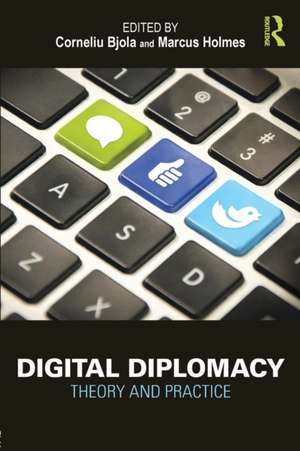Digital Diplomacy: Theory and Practice: Routledge New Diplomacy Studies
Autor Corneliu Bjola, Marcus Holmesen Limba Engleză Paperback – 19 mar 2015
This book analyses digital diplomacy as a form of change management in international politics.
The recent spread of digital initiatives in foreign ministries is often argued to be nothing less than a revolution in the practice of diplomacy. In some respects this revolution is long overdue. Digital technology has changed the ways firms conduct business, individuals conduct social relations, and states conduct governance internally, but states are only just realizing its potential to change the ways all aspects of interstate interactions are conducted. In particular, the adoption of digital diplomacy (i.e., the use of social media for diplomatic purposes) has been implicated in changing practices of how diplomats engage in information management, public diplomacy, strategy planning, international negotiations or even crisis management. Despite these significant changes and the promise that digital diplomacy offers, little is known, from an analytical perspective, about how digital diplomacy works.
This volume, the first of its kind, brings together established scholars and experienced policy-makers to bridge this analytical gap. The objective of the book is to theorize what digital diplomacy is, assess its relationship to traditional forms of diplomacy, examine the latent power dynamics inherent in digital diplomacy, and assess the conditions under which digital diplomacy informs, regulates, or constrains foreign policy. Organized around a common theme of investigating digital diplomacy as a form of change management in the international system, it combines diverse theoretical, empirical, and policy-oriented chapters centered on international change.
This book will be of much interest to students of diplomatic studies, public diplomacy, foreign policy, social media and international relations.
| Toate formatele și edițiile | Preț | Express |
|---|---|---|
| Paperback (1) | 413.33 lei 6-8 săpt. | |
| Taylor & Francis – 19 mar 2015 | 413.33 lei 6-8 săpt. | |
| Hardback (1) | 1055.51 lei 6-8 săpt. | |
| Taylor & Francis – 26 mar 2015 | 1055.51 lei 6-8 săpt. |
Din seria Routledge New Diplomacy Studies
-
 Preț: 386.77 lei
Preț: 386.77 lei -
 Preț: 326.30 lei
Preț: 326.30 lei -
 Preț: 288.80 lei
Preț: 288.80 lei -
 Preț: 416.22 lei
Preț: 416.22 lei -
 Preț: 408.54 lei
Preț: 408.54 lei - 25%
 Preț: 824.53 lei
Preț: 824.53 lei - 25%
 Preț: 823.44 lei
Preț: 823.44 lei - 23%
 Preț: 320.80 lei
Preț: 320.80 lei -
 Preț: 381.51 lei
Preț: 381.51 lei -
 Preț: 469.34 lei
Preț: 469.34 lei - 18%
 Preț: 699.96 lei
Preț: 699.96 lei -
 Preț: 419.92 lei
Preț: 419.92 lei -
 Preț: 263.90 lei
Preț: 263.90 lei -
 Preț: 389.38 lei
Preț: 389.38 lei -
 Preț: 385.11 lei
Preț: 385.11 lei -
 Preț: 387.16 lei
Preț: 387.16 lei -
 Preț: 388.52 lei
Preț: 388.52 lei - 18%
 Preț: 1004.34 lei
Preț: 1004.34 lei -
 Preț: 356.75 lei
Preț: 356.75 lei -
 Preț: 311.41 lei
Preț: 311.41 lei -
 Preț: 326.01 lei
Preț: 326.01 lei - 18%
 Preț: 1005.39 lei
Preț: 1005.39 lei - 31%
 Preț: 767.38 lei
Preț: 767.38 lei
Preț: 413.33 lei
Nou
79.11€ • 81.53$ • 66.79£
Carte tipărită la comandă
Livrare economică 03-17 martie
Specificații
ISBN-10: 1138843822
Pagini: 252
Ilustrații: 5 black & white tables, 7 black & white line drawings
Dimensiuni: 156 x 234 x 13 mm
Greutate: 0.39 kg
Ediția:1
Editura: Taylor & Francis
Colecția Routledge
Seria Routledge New Diplomacy Studies
Locul publicării:Oxford, United Kingdom
Public țintă
Postgraduate, Professional, and UndergraduateCuprins
Notă biografică
Corneliu Bjola is Associate Professor in Diplomatic Studies, University of Oxford, and author or editor of three previous books, including Understanding International Diplomacy (with M. Kornprobst, Routledge 2013). Marcus Holmes is Assistant Professor of Government, College of William & Mary, USA.
Recenzii
‘This unique collection of case studies on digital diplomacy dispenses with technological determinism and concentrates upon the management of change across the core practices of diplomacy. As such, it represents a timely and indispensable intervention in an emerging field of practice and scholarship.’-- James Pamment, University of Austin, Texas, USA
'The authors in this book, academics and practitioners, do not only have an interest in everything digital. Crucially, they successfully marry that knowledge to a solid understanding of 21st-century diplomatic practice. That is what makes this book special and so far indeed a unique contribution to the field.' -- Jan Melissen, Netherlands Institute of International Relations 'Clingendael', and University of Antwerp, Belgium
Descriere
This book analyses digital diplomacy as a form of change management in international politics.
The recent spread of digital initiatives in foreign ministries is often argued to be nothing less than a revolution in the practice of diplomacy. In some respects this revolution is long overdue. Digital technology has changed the ways firms conduct business, individuals conduct social relations, and states conduct governance internally, but states are only just realizing its potential to change the ways all aspects of interstate interactions are conducted. In particular, the adoption of digital diplomacy (i.e., the use of social media for diplomatic purposes) has been implicated in changing practices of how diplomats engage in information management, public diplomacy, strategy planning, international negotiations or even crisis management. Despite these significant changes and the promise that digital diplomacy offers, little is known, from an analytical perspective, about how digital diplomacy works.
This volume, the first of its kind, brings together established scholars and experienced policy-makers to bridge this analytical gap. The objective of the book is to theorize what digital diplomacy is, assess its relationship to traditional forms of diplomacy, examine the latent power dynamics inherent in digital diplomacy, and assess the conditions under which digital diplomacy informs, regulates, or constrains foreign policy. Organized around a common theme of investigating digital diplomacy as a form of change management in the international system, it combines diverse theoretical, empirical, and policy-oriented chapters centered on international change.
This book will be of much interest to students of diplomatic studies, public diplomacy, foreign policy, social media and international relations.






















